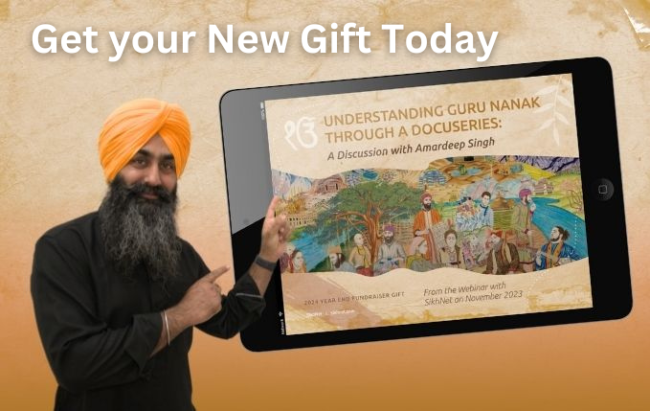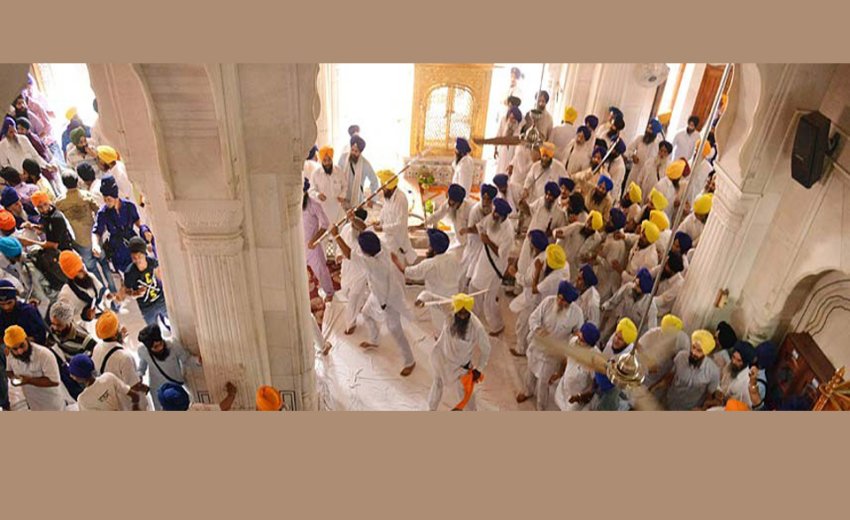Today I step gingerly, with some determination and considerable unease, but limited optimism, if any. Why open this box that’s full of troubles?
I invite you to think with me for a moment. When I came to the USA there were so few Sikhs around that if we sighted one on the street it seemed like a miracle and we crossed the street with a beaming smile to greet each other. Now, there seem to be so many that perhaps many cross the street to avoid one.
When visiting a new city or neighborhood we anxiously asked if there was a gurduara in town. We progressed? Now there are perhaps ten gurduaras in commuting distance from where I live, and I doubt there is a decent sized town in America that has none. I have heard of perhaps 200 or more gurduaras in the good old U.S of A.
But there is a miracle of miracles. With the exception of one or two (certainly in the single digits) almost all gurduaras have a history of financial irregularities, violence during meetings, election shenanigans and borderline criminal behavior. Our behavioral model seems to look like this: One has to entreat, almost sweet talk, beg and cajole volunteers to join the management committee – it is voluntary work that takes hours of energy but promises almost no reward beyond the satisfaction of doing some seva to the community. But then when a year or two have passed and it is perhaps time to pass the baton to a new team, these same reluctant leaders are no longer the shy brides. They have to be kicked out. They act as if they are the primary owners with birthrights to the gurduara.
I forgot to add that I am talking about Sikhs – not in Punjab but in the diaspora. I should add that I am talking of a well-educated community who have been here more than a few years, hold decent jobs, are affluent beyond question and are shrewd businessmen. Every gurduara seems to have a Constitution. They talk about it, but only if forced to do so. Do they ever look at it? I would bet not.
How can such bright successful people be so clueless, I ask you? As they say, the road to hell is paved with good intentions and we seem have more than enough good intentions to pave several multilane highways to hell and back.
Think about this: If a majority of gurduaras are in legal and societal limbo, is there something wrong with us – an educated, prosperous community? What do we need? Professional counselors?
A prominent gurduara, one of the most expensive in the country now seems to be in conniptions now. The place and the people will remain anonymous. My purpose is not to shame them; I suspect they are too hot-headed and hard-headed to even think of it. Over a couple of days, I got the chance to sit with some of the movers and shakers on both sides of the divide. The vitriol shocks me. The divisions among the gurduara crowd (I hate to label it a sangat!) seem etched in stone. And these are people that we have admired for so many years. Did we misjudge them so much for so long? I offer you one example of their behavior: A row during which the police had to be called. But the post-mortem analysis did not explore the why and the how of the situation but focused on the fact that the police entered the premises with their shoes on.
And that, to me, is a no-brainer. Our taxes pay for the police; their job is to maintain peace
We need to understand that without sitting together there will be no solution to our divide – no bridge on this span. They have to be open to the possibility of violence – armed or not. So, the police must come in uniform, including shoes and suitably armed. If this is shameful, the onus is not on the police but on the Sikhs.
In their present frame of mind, the two sides won’t sit productively together. If they don’t there will never be a solution.
The gurduara has a Constitution that is routinely flouted, but rarely followed. So we look for responsibility, process and resolution in extra-constitutional frameworks.
An aside: I came to this country almost 60 years ago and have seen many new government regimes come and go over the years. Often the U.S. Congress was severely divided between the Republicans and Democrats, yet they collaborated to find workable solutions. (I know that things have changed dramatically these days, and the results show it.)
In a negotiated process of mediation neither side gets what it wants. The idea is to be able to come together. Why? Because the needs of the nation or community are paramount. Friends, life is NOT a zero-sum game, nor is this disagreement between us such a framework.
Our internal disagreements are natural. Every dynamic family or community will have them. But they can hurt us significantly unless we manage them wisely. Give the same dignity to your enemies that you want so badly for yourself.
This means that, even though we differ, we will have to sit together in a dignified ambiance of patience and tolerance, if not respect. And we will have to LISTEN DEEPLY to each other as Guru Granth (Dhanasri I, p,660) asks us to do: Jub lug dunyaa rahihae Nanak kitch sunyae kitch kahiyae. (As long as we are in this world, O Nanak we should listen and speak to the One in everyone.)
We seem to be diminishing some critical fundamentals: patient listening, a sense of humility, openness, some give and take – flexibility, a sense of trust, and the idea of the Servant-Leader. These days Business Schools often teach this idea of the Servant-Leader. We have taught it longer than they, but now we need to rediscover and re-embrace it as the concept of Gur-Chelaa. Furthermore, the Guru Granth offers some telling advice (Ang 185) Hoe iktr milo mere bhai, dubhida door karo liv layee; har namae ke hovo jorhee, gurmukh baeso safaa bichhaaee. (Come and join together my brothers; dispel your sense of duality and let yourselves be lovingly absorbed in the One. Let yourselves be joined to the Name of the Lord; become Gurmukh, spread out your mat, and sit down together.)
The point is not whether the idea of “term-limits” is clearly addressed in the Gurduara Constitution. In my view it is fairly stated and should be clarified as necessary, and embraced. In my view it is clear that for everyone a role in management should be respected and accepted but it is not a life-time appointment.
(Note that in the USA for over 200 years there was no law of term limits on the Presidency, yet only three (or four!) tried for a third consecutive term, and only one – FDR – succeeded. A Constitutional amendment, ratified only in 1951, created the legal bar to a third term.)
Keep in mind that the Trustees and Executive are Custodians and Administrators of the gurduara, they are never its owners.
So, at this time can we convene a productive meeting? Likely not. So, what do we do? I recommend several short progressive meetings, each with a few but equal number of participants from each side. The agenda to remain unchanged: Airing of specific grievances and needs, and proposing specific solutions. This must be done with patient listening. These are members of the Sangat, and some may be formally enrolled paid members of the gurduara while others are not.
The purpose is to capture and spread the spirit of reconciliation from and to as large a Sangat as possible. And keep the membership drive open year-round. I know that, unfortunately, there is talk from some about closing the membership.
Soon after this step towards reconciliation should come a general body meeting of members only – there must be an official membership roll somewhere. Communication must be kept open. From this, proceed to new elections and appointments etc., as well the formation of a subcommittee, if necessary, to reexamine the Constitution.
The way things are at this time, surely one side will win the battle but lose the war. In a process of reconciliation, however, neither side will, nor should it, win everything it wants. Sorry if what I said seems alike a rant, but it is a necessary step.
I wanted to say something about how to win friends and influence people. But on re-reading perhaps my rant is an abject lesson on how to burn your friends and lose influence.
Life is not a Zero- Sum Game. Do Not Win a Battle only to Lose the War.
Part of me regrets having to hang our dirty laundry in our backyard, yet that is what I am called to do. But remember, sunshine is the best remedy for dirty laundry.






